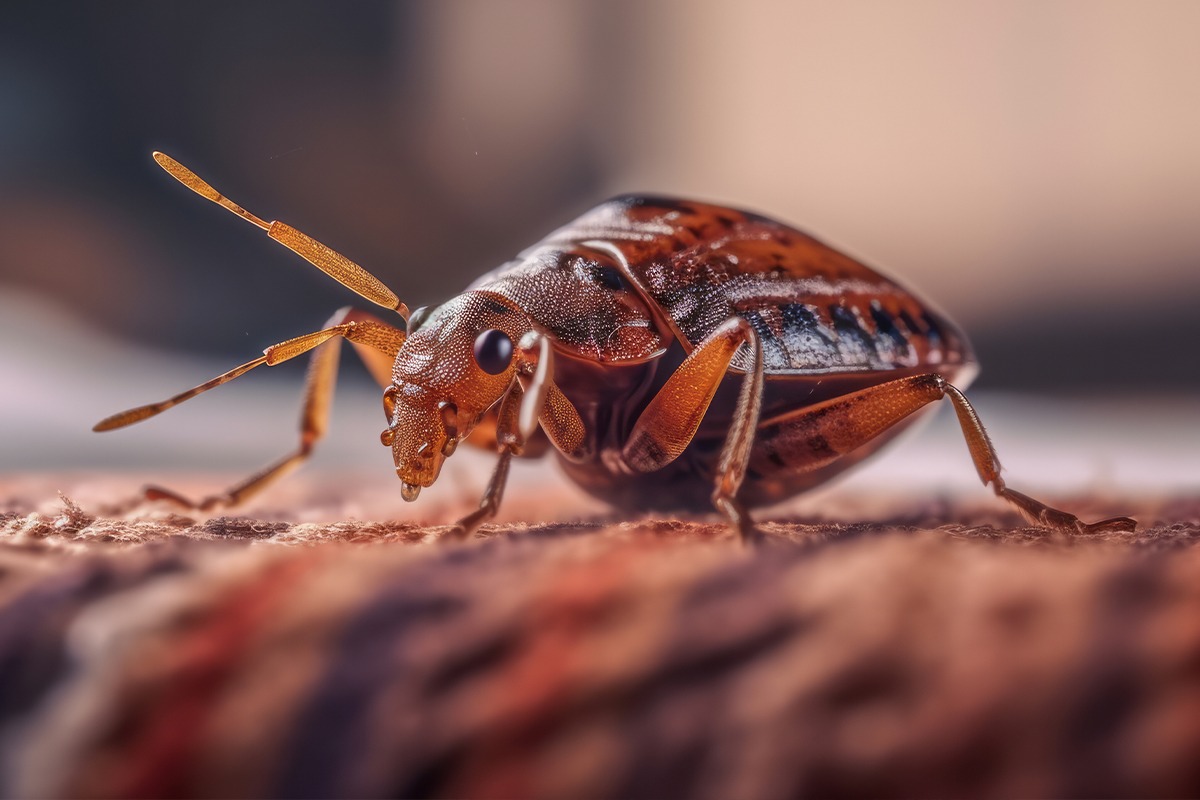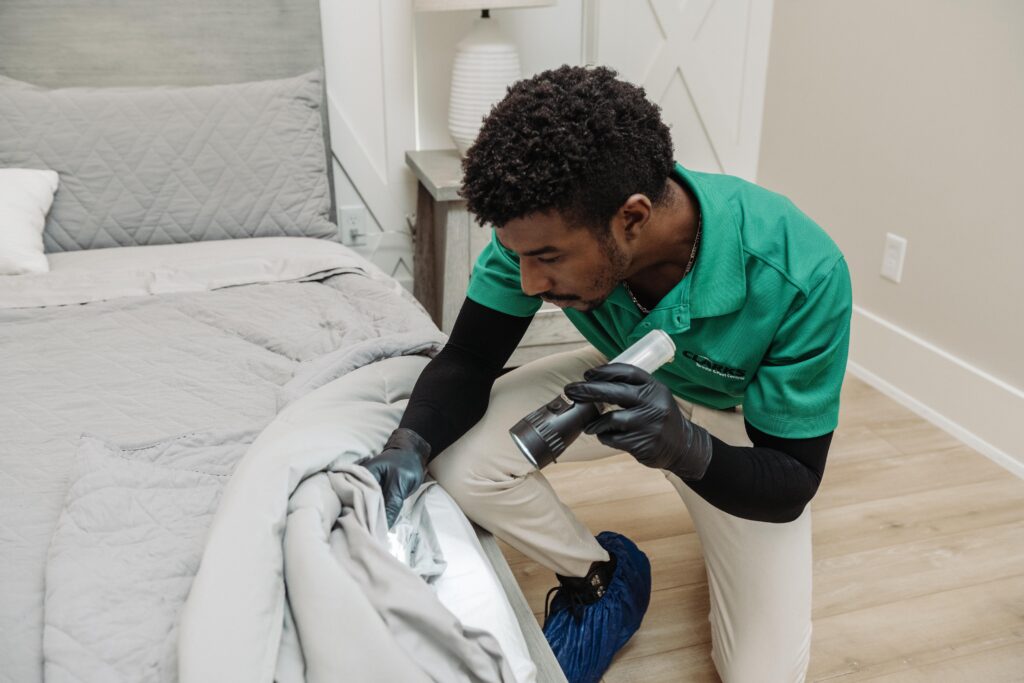Bed Bug Treatment
Perhaps you’re worried about bed bugs invading your home. After all, the recent eruption of these pests in Paris shocked the world, making you scared it might happen to you in the Carolinas.
Well, this fear isn’t misplaced—bed bugs aren’t like other bugs. They are sneaky little creatures that find their way into your home without you noticing until it’s too late.
If that sounds scary, it’s because it is!
These pests are known to reproduce fast, and if you have a few on your bed or couch, they can quickly turn your nights into a living nightmare and days into tiresome battlegrounds.
What is a Bed Bug?

Most people aren’t familiar with what a bed bug looks like or how to identify one, leading to misconceptions and uncertainty.
Bed bugs are tiny, nocturnal insects that thrive in warm habitats, often close to their preferred food source—human blood. They are flat-bodied creatures, roughly oval-shaped, and about the size of an apple seed—approximately six millimeters long.
While their existence dates back thousands of years, they aren’t necessarily a sign of an untidy home in the Carolinas. Anyone can end up with bed bugs, as they’re skilled hitchhikers and often spread through travel. When an infestation occurs, these bugs usually hide in spaces like the seams of mattresses, furniture, or even tiny holes in the wall, only emerging at night to feed.
Their bite is typically painless, but it’s the aftermath that can be problematic. Some people can have allergic reactions causing itchy spots or rashes, while others might not show any signs at all.
Signs That You Have Bedbugs At Home
Given that a female bed bug can lay between 200 to 500 eggs during her life, it’s not surprising that bed bug numbers can grow quickly. This means you won’t have an invisible problem; there will be clear signs.
So, how do you know when you have these unwanted guests at home? Here are some telltale signs to look out for:
- Bed Bug Bites: Bed bugs love feeding on sleeping humans, usually leaving groups or lines of red, itchy, and swollen bites on your skin. These bites can cause significant discomfort and are often arranged in a zigzag pattern.
- Blood Stains on Sheets: Crushed bed bugs can leave small reddish-brown smears on your bedding, including sheets, pillowcases, and comforters. If you notice these stains, it is crucial to inspect your mattress and surrounding areas for any bed bug activity.
- Dark Spots: Bed bugs excrete a dark substance after feeding. Observe tiny black spots on your mattress, bedding, and even nearby furniture, as this could indicate their presence. The clusters of fecal spots will resemble black pepper grains.
- Bed Bug Eggs/Eggshells: These tiny, 1mm-sized, and pearly white eggshells are often found tucked away in the corners, seams, and crevices of your bed. Bed bugs lay hundreds of eggs, so finding these may suggest a growing population.
- Saliva stains: Bed bugs leave minuscule dark spots due to their saliva. These stains are typically found around their hiding spots, such as mattress seams, bed frames, and upholstered furniture—indicating the areas they frequent.
- Molted skins: As bed bugs grow and mature, they shed their skin multiple times. Keep an eye out for discarded light-brown exoskeletons, which often accumulate near their nesting sites and can confirm an infestation.
- Live bed bugs: Live bed bugs are elusive and most active at night. You might see them on your mattress or crawling on your bed frame after waking up. Be vigilant for these brown, wingless insects the size of an apple seed.
If you do notice any of these signs, we recommend you take swift action by contacting a trusted bed bug control expert to address the infestation and restore peace to your home.
Why Are Bed Bugs a Problem?
Nobody needs to be told how unpleasant a bed bug bite can be, especially in the Carolinas, where these critters can quickly become an issue. These tiny parasites, though not known to carry diseases, create challenges that range beyond their bite.
Here’s why bed bugs pose a significant problem in the Carolinas:
- Rapid Multiplication: Bed bugs reproduce quickly. Females lay hundreds of eggs, meaning a minor issue can escalate into a major infestation swiftly if not addressed.
- Stealthy Habits: Bed bugs are elusive. They hide in small cracks and crevices during the day, making them hard to detect and eradicate completely without professional bed bug extermination help.
- Persistent Bites: Their bites aren’t just itchy. Frequent scratching may lead to skin infections, complicating what seems like a simple annoyance.
- Psychological Stress: The knowledge of sharing your living space with bed bugs can lead to sleep deprivation and increased anxiety, affecting overall mental health.
Bed bug problems are not to be taken lightly. Given their impact on your comfort, health, and peace of mind, it’s crucial to seek prompt professional help, like that offered by Clark’s Pest Control, at the first signs of their presence.
How can you prevent bed bugs?
In the Carolinas, where bed bugs can infest without warning, there are specific prevention measures our experts at Clark’s Pest Control recommend.
1. Travel Mindfully:
Whether you’re staying in hotels or dormitories, thoroughly inspect your accommodations for any signs of bed bugs. They could be hiding in mattress seams, between the bed and headboards, or within bed frames. Also check your luggage before you leave as that is where they are most likely to stow away.
2. Be Observant:
Stand guard and pay attention to your immediate environment. Being watchful can help you spot early tell-tale signs of a potential infestation and prevent them from escalating.
3. Inspect Second-Hand Furniture:
Think twice before bringing used furniture into your homes, as these items might house dormant bed bugs. A thorough inspection can save you from unknowingly introducing these pests into your home.
4. Maintain Cleanliness:
Though simply keeping your homes clean isn’t a foolproof plan, it does make it easier to spot infestations and take timely action.
5. Use Protective Covers:
Encase your mattress and box springs with tightly sealed covers to deprive these pests of their preferred hiding spots.

Defeat Bed Bugs in the Carolinas with Clark’s Pest Control
Wondering how to rid your Carolina home or business of bed bugs for good? Sure, some tips may help prevent infestations, but there’s just one guaranteed solution—turn to the professionals.
Clark’s Pest Control, experts in eliminating and preventing bed bug infestations, utilize Integrated Pest Management (IPM) to identify and address the core of the issue effectively. IPM ensures pest control methods minimize risks to people, pets, and the environment.
Don’t let bed bugs disrupt your life any longer. Call Clark’s Pest Control for a FREE, NO-OBLIGATION estimate at 866-781-4991, or schedule your appointment online today.
Bed Bug Remediation FAQs
No, discarding your mattress or furniture is not a necessary step in treating a bed bug infestation. Our bed bug control professionals use specialized treatments that effectively eradicate bed bugs while preserving your belongings.
While bed bugs are known to hitch rides on pets, they don’t infest them like fleas or ticks. They prefer human hosts, and pets are usually incidental carriers.
Absolutely! Regular inspections, frequent vacuuming, and professional preventive treatments can significantly reduce your risk of a bed bug infestation.
While it’s possible to treat minor bed bug infestations yourself, it’s often ineffective. Bed bugs are highly elusive, can hide in small cracks, and their eggs are resistant to many forms of treatment. Professional bed bug exterminators in the Carolinas have the tools and knowledge needed to thoroughly eliminate bed bugs.
Currently, no evidence suggests that bed bugs transmit diseases to humans. However, their bites can lead to itching, allergic reactions, and secondary skin infections due to scratching.
GET A FAST FREE ESTIMATE

